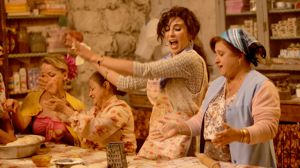I should be writing this letter to a lady. Then I could congratulate you for adding to the chorus of female empowerment spoken and sung through this intelligently absorbing film. Instead, I'm singling you out as the man who's job it is to silence their voices. How dare you! I wanted more! I loved everything this film had to say, and more importantly, how they said it.
I suppose most of the credit belongs to Lebanese director/producer/co-writer/star Nadine Labaki. Her film, set in an unspecified Middle Eastern village, follows an isolated community of Muslims and Christians who are cut off from the religious conflicts that surround them. But as sectarian mischief and violence draws near, the women of both faiths band together and find increasingly creative ways to make their men see no evil, hear no evil, speak no evil. The result is the most serious comedy I've ever seen.
Having an important message actually helps the humour at every turn. When the entire village is together watching their only TV, the way you edit in the women's desperate outbursts to drown out the news is expertly done. We're trying to hear both sides - the women's overblown accusations of men picking their nose, as well as the newscaster explaining a recent conflict. What we can make out provides just the right balance of tension and comedic release.
The opening scene also hits that equilibrium perfectly. The women, dressed in black, seem to be performing a silent flash mob dance on their way to a funeral. Their faces are cold and serious, but their movements are warm, tightly choreographed and too complicated to be strictly traditional. This juxtaposition perfectly sets our expectations for the type of hybrid film we're about to see. No wonder Canucks made it the surprise Audience Award winner at the 2011 Toronto International Film Festival. In relation to Canadian cinema, it's like La grande seduction _meets _Incendies. With a touch Bollywood.
Your job certainly got easier when the women bring a bus full of blonde Russian female dancers to the village as temporary distractions: the men are left speechless watching the bathing beauties. But a misinterpretation also reveals an unexpected rift in the story's central romance. The way Labaki's character translates and exchange from Arabic to English reveals exactly how much misogyny and violence the women are willing to hide to protect their men. Seeing this example of diagetic dialogue editing helps us appreciate how nuanced your job can be behind the scenes.
Let me end by saying the film works wonders. The stakes are sky high and the final resolution is bold, unexpected, and poignant. You clearly understood what to emphasize, and eventually let actions speak louder than words. I guess you knew what you were doing after all. So you get the last laugh - literally, since the title comes from a climactic moment of clearly articulated dialogue.
Thanks for listening,
Christopher







